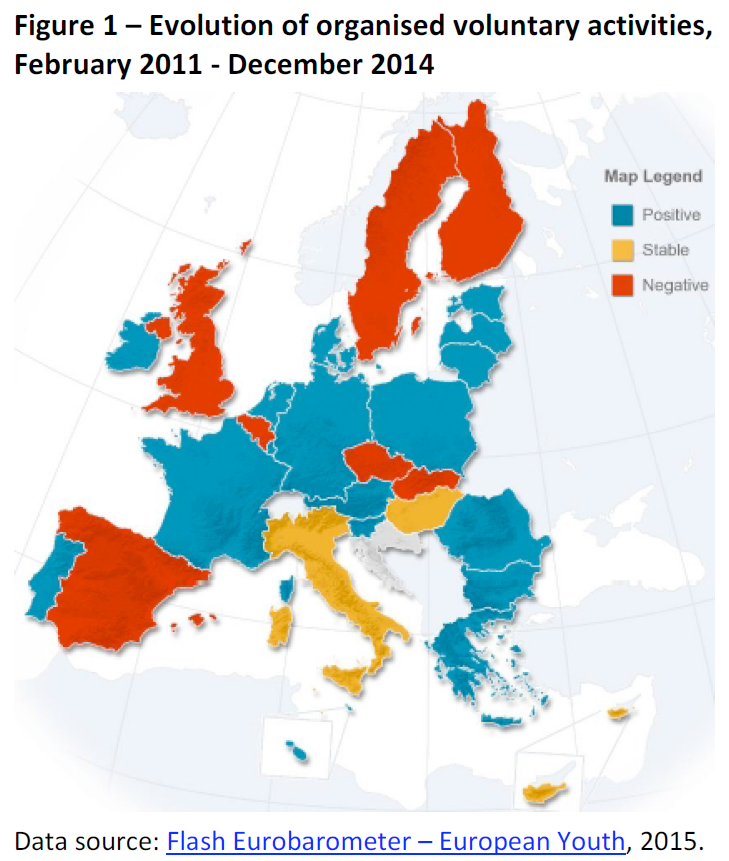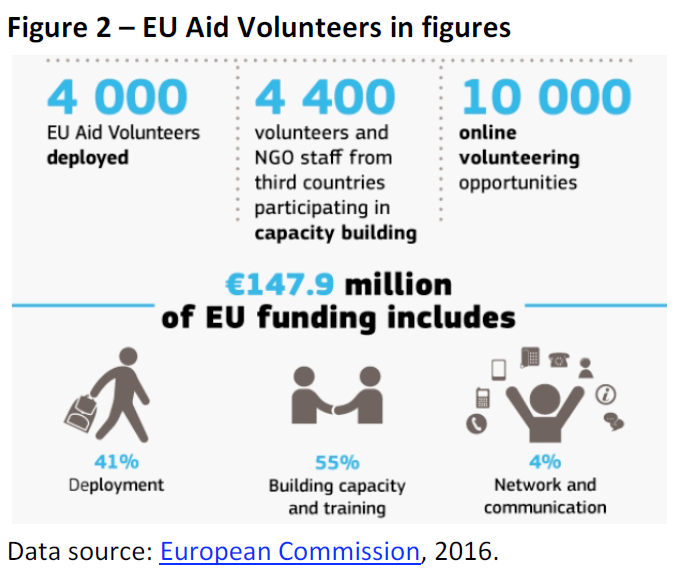Written by Ivana Katsarova,
Volunteering is a core expression of civic participation. Over the last 20 years, some 100 000 young people have taken part in international volunteering through the European Voluntary Service, thus contributing to sectors as varied and diverse as education, youth, culture, sport, environment, health, social care, consumer protection, humanitarian aid, development policy, research, equal opportunities and external relations.
Main features and challenges
Facts and figures

Estimates show that between 92 and 94 million adults in the EU – i.e. 22 % to 23 % of Europeans aged over 15 – are involved in volunteering, defined as an activity undertaken of a person’s own free will, primarily within a non-governmental organisation for a non-profit cause.
A Eurobarometer survey published in April 2015, revealed that the most common areas for volunteering are charity, humanitarian and development aid (44 %); education, training or sport (40 %), and culture or art (15 %). Their activities are usually aimed at a local community (66 %) or the volunteer’s country as a whole (27 %). Cross-border volunteering remains modest, with only 7 % of activities being aimed at another EU country, and 11 % at other parts of the world.
Even though there has been a general increase in the number of active volunteers and voluntary organisations in the EU over the past ten years, 93 % of respondents indicated that they have never volunteered abroad. The survey also suggests that more than half (54 %) of the young people who had taken part in organised voluntary activities did not incur any expenses, a further 28 % of respondents incurred expenses without receiving any contributions, and one in six respondents (16 %) were compensated for their expenses.
Volunteering has evolved at a different pace across the EU. While some countries have long-standing volunteering traditions, in others, the voluntary sector is still poorly developed or has yet to emerge. For instance, over a third of young people in Ireland (42 %), Denmark (39 %) and the Netherlands (38 %) have done a volunteering activity, while respondents in Bulgaria (10 %), Greece (13 %) and Sweden (15 %) are the least likely to have done so. Compared to 2011, the largest increases can be seen in Cyprus (+8 %), Italy (+7 %) and Portugal (+6 %); see Figure 1.
Barriers to volunteering
A 2015 EPRS analysis (Cost of Non-Europe report on cross-border volunteering) concluded that the costs associated with barriers to cross-border volunteering amount to an estimated average of around €65 million per year. These barriers could be overcome through EU action and are mainly linked to a lack of legal recognition (leading to the loss of social security and unemployment benefits), consistent recognition of the skills acquired, diversity in recruitment, and adequate training for cross-border volunteers.
Practitioners deplore the lack of clear and consistent policy on volunteering at national level. At the same time, it remains difficult to regulate volunteering, because of the complexity and diversity of the voluntary sector across EU countries. To unleash the full potential of cross-border volunteering, the existing barriers need to be removed by setting uniform standards across the EU. A European Parliament resolution (2013) recommended the creation of a European Statute on Associations, to ensure that volunteer organisations are given proper legal and institutional recognition. However, experts argue that the costs linked to the development of such a statute would be disproportionate, and suggest instead a voluntary code on cross-border volunteering through a Commission communication.
Listen to podcast: Volunteering in the EU
[youtube=https://youtu.be/6UgR_ibyqFU&w=640&h=389]
EU initiatives
EU-funded schemes are the main suppliers of cross-border volunteers in Europe.
The European Voluntary Service
Over the last 20 years, an estimated 100 000 young people have taken part in international volunteering through the European Voluntary Service (EVS). It started in 1996 as a pilot action. Later, EVS became part of the Youth programme (2000-2006), and continued to be a flagship activity under the Youth in Action Programme (2007-2013) and within the current Erasmus+ programme (2014-2020). An EVS project is a partnership between two or more promoting organisations. Projects last from 2 weeks to 12 months. Volunteers – aged between 17 and 30 – receive support to cover travel and living costs, as well as pocket money and insurance. Upon completion of the project, they obtain a certificate confirming their participation.
European Volunteer Centre
The European Volunteer Centre is a European network of over 80 national, regional and local volunteer centres and support agencies across Europe. Each year, it runs the European Volunteering Capital competition with the aim to promote volunteering at the local level by giving recognition to municipalities that support and strengthen partnerships with volunteer centres and celebrate and promote volunteering and the impact made by volunteers. The winner of the 2016 edition is London.
The EU Aid Volunteers
Another opportunity for cross-border volunteering is offered by the EU Aid Volunteers programme (see Figure 2) that provides practical support to humanitarian projects and disaster-affected communities for periods of between one and 18 months. It also hosts an online platform for virtual volunteering. The initiative is open to EU citizens and long-term third-country residents in an EU country, aged 18 or over. The first volunteers will be deployed in autumn 2016. The programme covers travel costs, insurance and accommodation. In addition, volunteers receive a monthly subsistence allowance. Other cross-border volunteering schemes include the Europe for Citizens programme, and the Grundtvig Programme.
Role of the European Parliament
A 2013 resolution of the European Parliament underscored the importance of the skills and knowledge gained through volunteering for the integration of the job market and put forward the creation of a ‘skills passport’. Members have also repeatedly called for more funding, the removal of technical barriers, and the creation of a European Volunteer Centre Development Fund. The Parliament also initiated the European Year of Volunteering 2011 to celebrate the efforts of those who take part in voluntary activities. The Parliament is to invite the Commission to outline its plans for the EVS and support to volunteering more broadly during the October II plenary.
Volunteering worldwide
One of the main actors playing an instrumental role in the promotion of volunteering at a global scale is the United Nations Volunteers (UNV) programme. Active in around 130 countries, it mobilises more than 7 700 people every year, with 80 % coming from developing countries, and more than 30 % volunteering within their own countries. UNV help to organise and run local and national elections and support a large number of peacekeeping and humanitarian projects. They comprise one third of all international civilians working in UN peacekeeping operations. In addition, UNV operates the Online Volunteering Service, a web-based virtual volunteering platform for various projects. UNV celebrates International Volunteer Day on 5 December every year. Other major international volunteering schemes include the International Red Cross and Red Crescent Societies, with more than 17 million active volunteers.
Read this at a glance note on ‘Volunteering in the EU‘ in PDF.

![Volunteering in the EU [Plenary Podcast]](https://theme-one.epthinktank.be/app/uploads/2016/10/eprs-aag-589841-volunteering-in-the-eu-final.jpg)








[…] […]
[…] https://epthinktank.eu/2016/10/20/volunteering-in-the-eu-plenary-podcast/ […]
[…] https://epthinktank.eu/2016/10/20/volunteering-in-the-eu-plenary-podcast/ […]